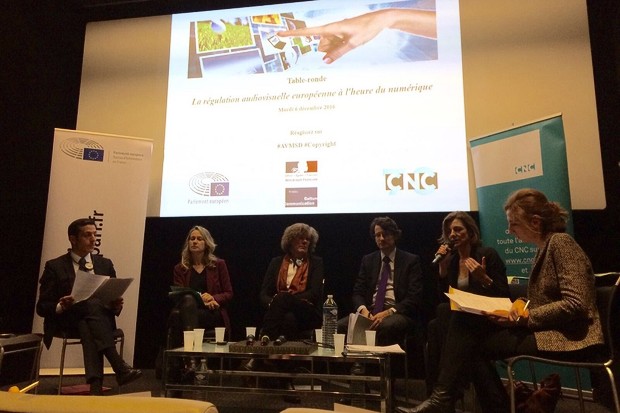Territoriality: danger ahead!
- The new cable and satellite regulation being discussed at European level has sparked strong concerns from the industry and the various Member States

"We can’t let what we’ve failed to get through the door creep past through small windows". At a debate and meeting organised in Paris by the CNC and the European Parliament Information Bureau in France, the subject of "European audiovisual regulation in the digital age" through the revision of the Audiovisual Media Services Directive (AMS - see article) and the reform of authors’ rights was gone over with a fine-tooth comb. But the reasons for being satisfied with the progress made and points of agreement with the proposals presented by the European Commission were largely overshadowed by disagreements over European quota levels for on-demand services and above all by strong concerns over the way the new draft cable and satellite directive (included in the packet of texts modernising authors’ rights) calls the territoriality of rights into question.
With regard to the "revision of the Audiovisual Media Services Directive", Martin Adjari, a representative from the French Ministry of Culture, pointed out that "the 20% European works quota proposed by the directive is below what we are currently seeing in the sector", with France calling for this threshold to be raised to 40%, an objective shared by Constance Le Grip (an EPP MEP and member of the "Creative Industries" intergroup). Needing to "listen to industry professionals who are calling for a clear sign that this will be done, with quotas also acting as a sort of safety net for the European film industry", German MEP Petra Kammerevert, who is the co-rapporteur for the European Parliament on the SMA proposal, has nonetheless highlighted that the limits of what is attainable must be respected": "20% is too low, 50% is too high. We’re moving to secure a consensus on 30%".
The debate has, on the other hand, become distinctly more impassioned over plans to modernise authors’ rights, in particular with the cable and satellite regulation. According to Jean-Marie Cavada (Vice-Chair of the European Parliament’s Committee on Legal Affairs and rapporteur of the draft regulation on the "cross-border portability of online content services in the Union"), who recalled that "creative industries in Europe are worth €536 billion a year with the promise of huge development", the text represents a considerable threat: "the re-broadcasting of content online should not call the country of origin principle into question. A broadcaster would obtain licences for 28 countries just by purchasing the rights to one territory! Territorial author rights are the backbone of the entire thing. If we call that into question, funding would slump by 50%, leading to a drastic fall in the number of works, leaving the path wide open for English language productions." A sentiment shared entirely by the French Ministry of Culture, represented by Alban de Nervaux, who stated that "the impact assessment was really very superficial" and openly expressed concerns over the "interaction between a project with shaky economic and legal foundations and a context of pending disputes, most notably with the SKY case", estimating that this "lateral" initiative rather dangerously calls the principle of the territoriality of rights into question. A point of view that reflects the growing opposition among professionals in Member States of the EU as noted by Constance Le Grip, who also expressed her surprise, confusion and concerns over the new cable and satellite regulation. "What’s the point of trying to destroy a system that works in exchange for another that would only work half as well and would only benefit the Americans" added Jean-Marie Cavada. "It’s clear that the "buy one, get 28" approach can’t work" concluded Petra Kammerevert, who nonetheless added that discussions had only just started and that they had to try to "find a solution between contractual freedom for authors and producers, whilst offering greater opportunities for broadcasting works across borders". In other words, the debate is far from over and it will be worth watching developments very closely as the entire future of European production could be decided in a small discrete corner of the ring.
(Translated from French)
Did you enjoy reading this article? Please subscribe to our newsletter to receive more stories like this directly in your inbox.
















